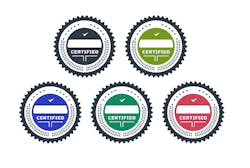5 reasons why MSO shops need OEM certifications
When customers are in need of vehicle repair to get back on the road, they are looking for one thing — a service shop they can trust. Thankfully, there are a few hallmarks of a reliable MSO, but the best way to demonstrate your worth is by becoming a certified auto repair shop.
There are many different types of certifications, issued by various authorities and manufacturers in the automotive industry. While it can be easy to dismiss certifications as not worth it, there are actually a number of benefits — for both MSOs and their customers.
What are repair certifications?
Repair certifications are fairly straightforward — they prove that an MSO shop employs trained technicians and is certified to perform specific types of repairs, use specific tools or work on a particular manufacturer’s vehicle. Earning a certification will vary depending on the issuing organization, but most require a rigorous vetting process, numerous tests and specialized training, and some even call for the MSO shop to invest in specific tools and equipment required by manufacturers. Certification is not a one and done process, either. Most must be renewed annually and can require re-testing and facility updates.
Types of repair certifications
There are essentially two types of certifications an MSO shop can obtain — an Original Equipment Manufacturer (OEM) certification and more general automotive industry certification.
OEM Certification: OEM certification demonstrates that a particular car manufacturer has evaluated the technicians, facilities, equipment and processes and have deemed it a quality repair facility.
General automotive industry certifications: These can demonstrate a number of proficiencies, from collision repair proficiency to cleanliness and reliability. Some of the most common certifications an MSO shop can attain include:
- I-CAR Gold Class
- S/P2
- AAA Approved
- Automotive Service Excellence
- Assured Performance Certified Repair Provider
Benefits of OEM Certification for MSO Shops & Customers
There are a number of benefits MSO shops can expect from earning both OEM certifications and auto industry certifications. Just a few include:
1. Improved customer loyalty
Many car owners are loyal to one vehicle brand, but it is estimated that 60 percent of vehicle owners will change brands after a total loss. By earning various OEM certifications, MSO shops can continue to serve their customers, regardless of what car they drive.
2. Proves reliability
OEM certification programs provide assurance to customers that their vehicle is being repaired properly. Bearing the name of a trusted manufacturer demonstrates that an MSO has met or exceeded their repair standards, and customers can expect their vehicle to be fixed well, often at a lesser cost.
3. Meets insurers' standards
Many insurers won’t cover repairs performed by MSO shops that don’t hold the appropriate OEM certifications. By getting these certifications, MSO shops have more customers they can serve, and customers thereby have more options for their vehicle repair.
4. Ensures regular training updates
Cars, and the technology that powers them, are advancing at a rapid rate. This means that technicians regularly need to learn the latest systems and the tools required to repair them. Studying and testing for these certifications ensures technicians are getting regular training and staying on top of their craft.
5. Diversifies technicians' skills
Working at an MSO shop means a technician will be tasked with repairing cars from a variety of manufacturers. But many manufacturers will have different training standards and equipment. To keep up, technicians will have to train on new manufacturers, learn new repair techniques and improve their already advanced auto repair knowledge.
With OEM certification, MSO shops can demonstrate their commitment to excellent service and ensure steady business growth for years to come.
About the Author
John C. Stolz
John oversees the management of seven collision centers in two states with $28 million in revenue. Day-to-day he develops business plans and budgets to meet the financial targets for the company while forecasting for industry changes and trends. John also ensures that day-to-day operations run smoothly and are supported by the Key Auto group as a whole.
